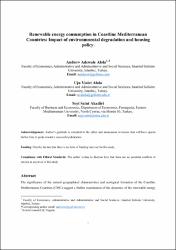Renewable Energy Consumption in Coastline Mediterranean Countries: Impact of Environmental Degradation and Housing Policy
Özet
The significance of the natural geographical characteristics and ecological formation of the Coastline Mediterranean Countries (CMC) suggests a further examination of the dynamics of the renewable energy consumption (renewables) within the aforesaid region. As such, the dynamic impact of carbon emissions and the housing construction policy vis-a-vis dwellings, building and residential developments on the renewable energy consumption is investigated among Spain, France, Slovenia, Greece, Turkey, Lebanon and Israel. The dynamic autoregressive distributed lag methods of the pooled mean group, mean group and dynamic fixed-effect estimators are adopted for the empirical investigation over the periods 1999-2014 with real income and tourism employed as an additional variable. Using the PMG estimators, empirical results show that positive and statistically significant relationship exists among the variables in the long run. A 1% increase in housing construction policy, real income tourism and carbon emissions leads to (0.955), (8.622), (0.007) and (6.805) increase in renewable energy growth, while deviations in the short run significantly adjust to long-run equilibrium under an unforeseen disturbance at a moderate annual speed of about 73% annually. The inference from the short-run estimated coefficients indicates that housing construction policy is not a driver of renewables in Israel. From a policy standpoint, proposed strategic housing development policy and environmental pollution mitigation policy by policymakers should be void of causing a disservice toward the enrichment of renewable energy generation domestically in the panel countries.
Cilt
26Sayı
25Bağlantı
https://hdl.handle.net/11363/1466Koleksiyonlar
Aşağıdaki lisans dosyası bu öğe ile ilişkilidir:


















